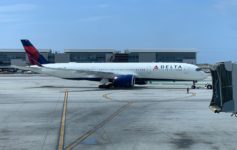
Even in the face of economic headwinds, Delta announced today its non-union workers worldwide will receive a 4% raise, marking the fourth year in a row of pre-emptive raises. This move serves a dual purpose of rewarding employees for their hard work and disincentivizing them from unionizing.
Delta Announces 4% Pay Raise For Non-Union Employees Worldwide
Delta Air Lines continues to laudably invest in its employees. Today, Delta revealed plans to award a 4% pay raise to eligible (non-unionized) employees around the world, marking the fourth straight year of compensation increases.
Following a $1.4 billion profit-sharing payout earlier this year, Delta is once again demonstrating that it views its people as the cornerstone of its success (and I think it’s fair to say you generally see that when you fly on Delta). In fact, since 2022, Delta has increased total compensation for its largest frontline workgroups by 25% or more–an impressive commitment that few airlines, or companies in any sector, can match.
Of course, there’s an ulterior motive…Delta also has the least unionized workforce among major airlines and these pay raises also dampen enthusiasm for union membership. Employees enjoy the best of both worlds: no union dues, but de facto union benefits driven, ironically, by Delta’s policy to dissuade its work groups from unionizing.
CEO Ed Bastian had first teased the raise back in January during a leadership conference, confident that strong travel demand had positioned Delta for its best financial year ever. Even as Delta has chucked its full-year profit forecast, it did not sacrifice what amounts to a generous cost-of-living increase for its employees. As Bastian put it, “For a century, Delta has acted on the belief that when we invest in our people first, they deliver excellence for our customers.”
“As we navigate these headwinds, we will continue to stay focused on protecting our people, our business, and our future, and strengthening Delta for the long term.”
Beyond base pay, Delta employees have access to other generous perks:
- Up to $100 monthly bonuses for operational goals
- Free financial coaching with a $1,000 emergency savings incentive
- 401(k) plans with up to 9% in company contributions
- Profit-sharing that in some years has equaled five weeks of extra pay
Delta’s compensation philosophy has set it apart not only from its airline peers but from virtually all U.S. employers. Over the last decade, Delta has paid out more than $10 billion in profit-sharing alone–more than any other U.S. airline or company.
Delta touts its reputation too, pointing out that it recently ranked #15 on Fortune’s 100 Best Companies to Work For list and was recognized as the #1 airline on the JUST Capital and CNBC “Just 100” list, which measures how well companies “support worker well-being and pay fair, living wages.”
CONCLUSION
While the industry faces pressures from rising costs, softening fares, and geopolitical turbulence, Delta is betting on a simple formula: invest in your people and they will deliver…and vote against unionization.
It’s a strategy that’s worked for 100 years and one that continues to set Delta apart…at least for now.
Tomorrow, we’ll take a look at how United Airlines flight attendants have fared so differently over the last four years.
image: Delta




it’s not a surprise that DL has led the industry in financial and customer service performance.
It is precisely in the midst of economic uncertainty that DL has the assurance that its people will continue to deliver.
meanwhile, UA’s FAs and mechanics have amendable contracts – the mechanics roundly shot down a contract proposal brought to them by their union and the company (sounds just like UA’s first pilot contract post-covid). by summer nearly all 65,000 non-pilot unionized UA employees will have amendable contracts.
UA”s profits will fall if it pays its employees well.
DL’s profits grow because it pays its employees well.
and the bigger impact is to AA and other carriers that just can’t afford the pay levels DL is offering but can’t afford to have their companies burned down by employees.
there aren’t many industries where the leader uses high costs as a competitive advantage but that is exactly where DL is today.
I hate so many things about Delta, but I admire the way they treat their workforce. Unionization is often viewed as expensive because of the pay/benefits that unionized groups negotiate, but this is a partial truth at best. In recent decades, it has become increasingly unusual for unions to negotiate salaries that are above market rates for the job in question. What makes unionization expensive is the massive inefficiencies that unions bring into a workplace. Union contracts are often hundreds of pages long and include endless rules that constrain and confine the ways in which workers and the business as a whole can accomplish their jobs. These restrict companies from finding new and better ways of doing things, and can often lead to laughably absurd workarounds that help nobody (see CRJ550). Added to this is the reality that the entire union business model is to create discontent among the workforce, lowering morale and efficiency. Delta is doing the right thing by keeping their employees happy and the unions at arms length.
Delta has surely done the math but the blind notion that DL pays its people more to keep out unions is a little shallow.
DL employees are happier because they aren’t constantly at war w/ their employer via their union and DL employees deliver higher quality service which is evidenced by the company’s revenue premium to the industry.
and DL does get better efficiency out of its workforce. I’m not sure the difference is that great for flight attendants and pilots but DL can do things with its ground workers including maintenance that allows DL to run a much more lean operation.
DL’s maintenance operation for other airlines is as successful as it is because DL uses retired mechanics that want to return for some work – but not work full-time – and DL can call them up when they have an engine from another airline to overhaul. Unions don’t allow that kind of thing.
SO, yes, DL gets benefits from matching its staffing to its needs but it also has a far less confrontational work environment which is why DL gets rated so much higher than most companies, not just airlines.
Why is a 4% pay raise considered preemptive instead of its the right thing to do given the continued rising cost of living. What is it with people’s obsession with Delta being nonunion and anything they do for their employees has to be preemptive to keep the union out instead of it being the right thing to do.
I’m not a Delta employee but I highly doubt a 4% raise will sway their employees view on unionization and if there were a vote to unionize in the near future a meager 4% raise isn’t going to be the difference maker.
You’ve missed (or ignored) that union shops get their pay raises determined way less frequently than annual.
I call it the way I see it, but I think you view the two as mutually exclusive and I don’t. Delta is looking out for its employees by keeping them from unionizing. Look at what the AFA-CWA has done for UA FAs…
I think it would take more than a 4% raise to keep the AFA-CWA at bay at Delta Airlines. I would wager for flight attendants at Delta quality of life just as important if not more important than a 4% raise.
What is the quality of life like for a Delta FA across the board from new hire to 30 year seniority FA compared to that of a union represented FA? If union represented FA’s have a better quality of life I think Delta could throw all the money they want at their FA’s they would still choose to go union but if Delta in addition to the meager 4% pay raise also offers improvement in quality of life for their FA’s then that could potentially keep the union at bay. Given all the union talk on sites like this over the past year or so I don’t think 4% is a preemptive move, and I don’t see it swaying any potential vote in favor or against unionization.
I think people (not saying you Matt in particular) want to see Delta FA’s unionize and once it happens those same people would then ripe Delta to shreds for letting it happen.
DL FAs don’t have to fight incessantly with their employer just to get paid. THAT is a massive improvement in QOL.
and so much of the talk about unionizing DL FAs comes from the union leaders at other airlines that want to see DL employees PULLED DOWN to the same level those unionized employees are at.
and it is said that some of DL’s most anti-union employees for years were the ex-Eastern employees.
Hersey-Blanchard at work: happy workers are productive workers!
@ Matthew — Exactly how much of Delta’s generosity has been funded by ripping off SkyMiles members? ALOT.